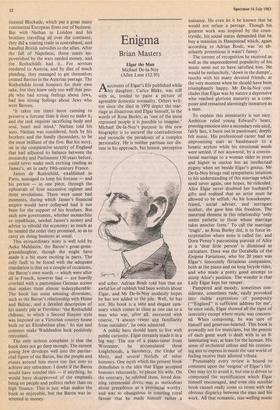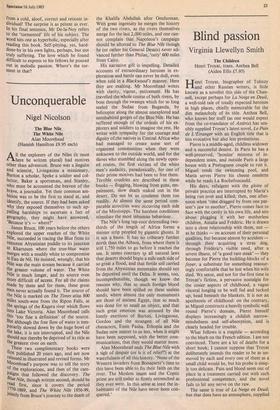Enigma
Brian Masters
Elm. the Man Michael De-la-Noy (Allen Lane £12.95) A accounts of Elgar's life published while 1—ihis daughter, Carice Blake, was still with us, tended to paint a picture of agreeable domestic normality. Others writ- ten since she died in 1970 depict the mar- riage as disastrous and Elgar himself, in the words of Rosa Burley, as 'one of the most repressed people it is possible to imagine.' Michael De-la-Noy's purpose in this new biography is to unravel the contradictions and reconcile the paradoxes of a complex personality. He is neither partisan nor dis- tant in his approach, but honest, perceptive
and sober. Adrian Boult told him that an awful lot of rubbish had been written about Elgar, and Mr De-la-Noy modestly hopes he has not added to the pile. Well, he has not. His book is a sane and elegant sum- mary which comes as close as one can to a man who was, after all, encrusted with reserve. '1 always resent any familiarity from outsiders', he once admitted.
A public hero should learn to live with public curiosity. Elgar certainly made it in a big way. The son of a piano-tuner from Worcester, he accumulated three knighthoods, a baronetcy, the Order of Merit, and several fistfulls of other honours. One myth which the present book demolishes is the idea that Elgar accepted honours reluctantly, to please his wife. On the contrary, he relished them, loved don- ning ceremonial dress, was as meticulous about precedence as a provincial worthy, and was so obsequious in courting royal favour that he made himself rather a nuisance. He even let it be known that he would not refuse a peerage. Though his greatest work was inspired by the coun- tryside, his social status demanded that he buy a mansion in Hampstead which, again according to Adrian Boult, was `so ab- solutely pretentious it wasn't funny.'
The torrent of recognition he received as well as the unprecedented popularity of his music seem not to have satisfied him. He would be melancholy, 'down in the dumps', touchy with his many devoted friends, at the very moment when he should have been triumphantly happy. Mr De-la-Noy con- cludes that Elgar was by nature a depressive who reached glorious maturity as a com- poser and remained alarmingly immature as a man.
To explain this immaturity is not easy. Ambition ruled young Edward's heart, pressing emotion into a secondary role until, fairly late, it burst out in passionate, deeply felt music. His professional career had an unpromising start as bandmaster to a lunatic asylum while his emotional needs were settled, if not answered, by a conven- tional marriage to a woman older in years and higher in station but an intellectual pygmy when set beside Elgar's genius. Mr De-la-Noy brings real sympathetic intuition to his understanding of this marriage which need never again, one hopes, be ridiculed. Alice Elgar never doubted her husband's gifts and realised that an artist must be allowed to be selfish. As his housekeeper, friend, social adviser, and surrogate mother, she gave him this freedom. The maternal element in this relationship 'only seems pathetic to those whose marriage takes another form.' To call the marriage 'tragic', as Rosa Burley did, is to force in- terpretation where none is called for, and Dora Penny's patronising portrait of Alice as a 'dear little person' is dismissed as caricature. Dora was the Dorabella of the Enigma Variations, who for 20 years was Elgar's innocently flirtatious companion, both at the piano and on long bicycle rides, and who made a pretty good attempt to usurp Alice's position. The wonder is that Lady Elgar kept her temper.
Pampered and moody, sometimes con- siderate, sometimes rude, easily provoked into risible expressions of pomposity ("'England" is sufficient address for me', he once said), Elgar showed all the signs of insecurity except where music was concern- ed. When composing, he was sure of himself and generous-hearted. This book is avowedly not for musicians, but the genesis of each great work is dealt with in an il- luminating way, at least for the layman. His sense of orchestral colour and his continu- ing aim to express in music the vast world of feeling receive their allotted tribute.
Presumably every review is bound to comment upon the 'enigma' of Elgar's life. One may try to avoid it, but one is driven to compound the mystification which Elgar himself encouraged, and even this sensible book cannot really come to terms with the obvious disparity between the man and his work. All that romantic, tear-welling music from a cold, aloof, correct and reticent in- dividual! The surprise is as potent as ever. In his final sentence, Mr De-la-Noy refers to the 'tormented' life of his subject. The word hits one as hyperbolic, especially after reading this book. Self-pitying, yes, hard- done-by in his own lights, perhaps, but not truly suffering. The love which he found difficult to express to his fellows he poured out in melodic passion. Where's the tor- ment in that?







































 Previous page
Previous page